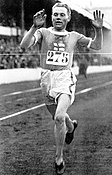Paavo Johannes Nurmi (13 June 1897 – 2 October 1973) was a Finnish middle and long distance runner. He was nicknamed as the "Flying Finn" as he dominated distance running in the early 20th century. Nurmi set 22 official world records at distances between 1,500 metres and 20 kilometres, and won a total of nine gold and three silver medals in his twelve events in the Olympic Games. At his peak, Nurmi was undefeated at distances from 800 m upwards for 121 races. Throughout his 14-year career, he remained unbeaten in cross country events and the 10,000 m.
In the 1920 Summer Olympics Nurmi took the silver medal in the 5,000 m and the gold in the 10,000 m and the cross country events. In 1923, Nurmi became the first, and so far only, runner to hold the mile, the 5,000 m and the 10,000 m world records at the same time. He went on to set new world records for the 1,500 m and the 5,000 m with just an hour between the races, and take gold medals in the distances in less than two hours at the 1924 Olympics. Nurmi won all his races and returned home with five gold medals, but embittered, as Finnish officials had refused to enter him for the 10,000 m.
At the 1928 Summer Olympics, Nurmi recaptured the 10,000 m title but was beaten to the gold in the 5,000 m and the 3,000 m steeplechase. He then turned his attention to longer distances, breaking the world records for events such as the one hour run and the 25-mile marathon. Nurmi intended to end his career on a marathon gold medal.
In a controversial case that strained Finland–Sweden relations and sparked an inter-IAAF battle, Nurmi was suspended before the 1932 Games by an IAAF council that questioned his amateur status. Although he was never declared a professional, Nurmi's suspension became definite in 1934 and he retired from running.
Nurmi, who rarely ran without a stopwatch in his hand, has been credited for introducing the "even pace" strategy and analytic approach to running, and for making running a major international sport. (Full article...)
